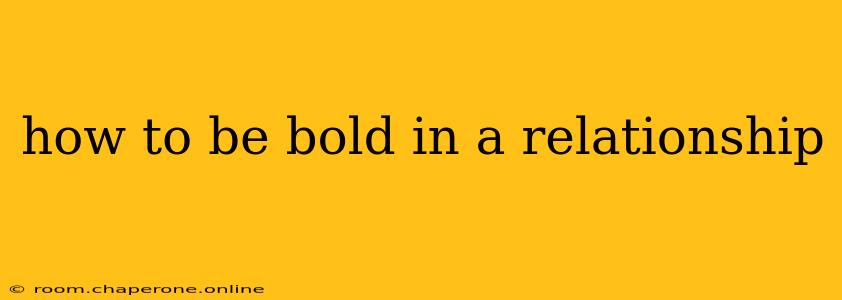Being bold in a relationship isn't about being brash or demanding; it's about confidently expressing yourself, advocating for your needs, and fostering a deeper connection with your partner. It's about embracing vulnerability and authenticity, leading to a more fulfilling and intimate partnership. This isn't about changing who you are, but about unleashing the best version of yourself within the relationship.
Understanding What "Bold" Means in a Relationship
Before we dive into actionable steps, let's clarify what "boldness" entails in a romantic context. It's not about dominating the relationship or disregarding your partner's feelings. Instead, it's about:
- Honest Communication: Openly sharing your thoughts, feelings, and needs, even when it's uncomfortable. This includes expressing both positive and negative emotions constructively.
- Setting Boundaries: Clearly communicating your limits and respecting your partner's as well. This fosters mutual respect and prevents resentment.
- Taking Initiative: Actively participating in planning dates, expressing affection, and initiating conversations about important matters.
- Expressing Your Needs: Articulating what you need from the relationship, whether it's more quality time, emotional support, or physical intimacy.
- Vulnerability: Allowing yourself to be seen and known, imperfections and all. This creates a deeper level of intimacy and trust.
- Self-Advocacy: Standing up for yourself and your values, even when it's challenging. This shows self-respect and strengthens your position within the partnership.
Steps to Cultivate Boldness in Your Relationship
Becoming bolder in your relationship is a journey, not a destination. It requires conscious effort and self-reflection. Here are some actionable steps to help you along the way:
1. Identify Your Fears and Insecurities
Before you can be bold, you need to understand what's holding you back. Are you afraid of rejection? Do you worry about upsetting your partner? Identifying your underlying fears allows you to address them directly and build confidence.
2. Practice Assertive Communication
Assertiveness lies at the heart of boldness. It's about expressing your needs and opinions respectfully and directly, without being aggressive or passive. Practice using "I" statements to express your feelings ("I feel hurt when...") instead of blaming your partner ("You always...").
3. Set Clear Boundaries
Healthy relationships thrive on clear boundaries. Identify your non-negotiables and communicate them clearly to your partner. This could involve anything from personal space and time to expectations regarding communication or intimacy.
4. Embrace Vulnerability
Vulnerability is a cornerstone of intimacy. Share your fears, insecurities, and dreams with your partner. This creates a safe space for authentic connection and strengthens your bond. It shows trust and invites reciprocal vulnerability.
5. Take Initiative
Don't wait for your partner to always initiate dates, conversations, or affectionate gestures. Take the lead sometimes! This demonstrates your investment in the relationship and creates a more balanced dynamic.
6. Seek Professional Guidance
If you're struggling to be bold in your relationship, consider seeking professional help. A therapist or counselor can provide guidance and support in developing healthier communication patterns and addressing underlying issues that may be contributing to your hesitation.
The Rewards of Boldness in a Relationship
Being bold in your relationship may initially feel daunting, but the rewards are significant. Open communication, clear boundaries, and genuine vulnerability foster deeper intimacy, stronger trust, and a more fulfilling partnership overall. It creates a dynamic where both partners feel seen, heard, and valued, laying the foundation for a lasting and loving connection. Remember, building a bold and authentic relationship is a continuous process of growth and self-discovery for both partners.

